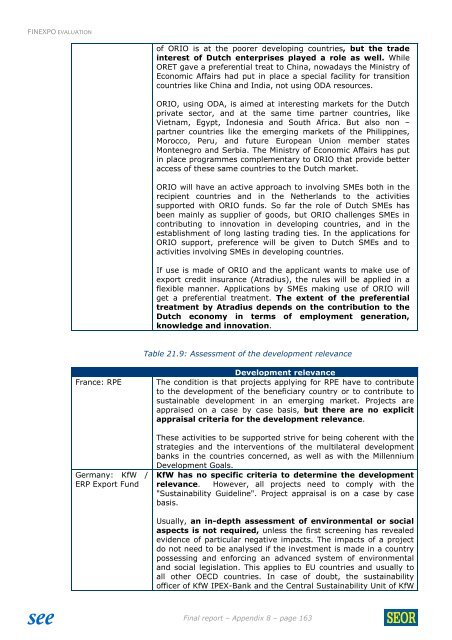Evaluatierapport (PDF, 6.47 MB) - Buitenlandse Zaken - Belgium
Evaluatierapport (PDF, 6.47 MB) - Buitenlandse Zaken - Belgium
Evaluatierapport (PDF, 6.47 MB) - Buitenlandse Zaken - Belgium
You also want an ePaper? Increase the reach of your titles
YUMPU automatically turns print PDFs into web optimized ePapers that Google loves.
FINEXPO EVALUATION<br />
of ORIO is at the poorer developing countries, but the trade<br />
interest of Dutch enterprises played a role as well. While<br />
ORET gave a preferential treat to China, nowadays the Ministry of<br />
Economic Affairs had put in place a special facility for transition<br />
countries like China and India, not using ODA resources.<br />
ORIO, using ODA, is aimed at interesting markets for the Dutch<br />
private sector, and at the same time partner countries, like<br />
Vietnam, Egypt, Indonesia and South Africa. But also non –<br />
partner countries like the emerging markets of the Philippines,<br />
Morocco, Peru, and future European Union member states<br />
Montenegro and Serbia. The Ministry of Economic Affairs has put<br />
in place programmes complementary to ORIO that provide better<br />
access of these same countries to the Dutch market.<br />
ORIO will have an active approach to involving SMEs both in the<br />
recipient countries and in the Netherlands to the activities<br />
supported with ORIO funds. So far the role of Dutch SMEs has<br />
been mainly as supplier of goods, but ORIO challenges SMEs in<br />
contributing to innovation in developing countries, and in the<br />
establishment of long lasting trading ties. In the applications for<br />
ORIO support, preference will be given to Dutch SMEs and to<br />
activities involving SMEs in developing countries.<br />
If use is made of ORIO and the applicant wants to make use of<br />
export credit insurance (Atradius), the rules will be applied in a<br />
flexible manner. Applications by SMEs making use of ORIO will<br />
get a preferential treatment. The extent of the preferential<br />
treatment by Atradius depends on the contribution to the<br />
Dutch economy in terms of employment generation,<br />
knowledge and innovation.<br />
Table 21.9: Assessment of the development relevance<br />
France: RPE<br />
Germany: KfW /<br />
ERP Export Fund<br />
Development relevance<br />
The condition is that projects applying for RPE have to contribute<br />
to the development of the beneficiary country or to contribute to<br />
sustainable development in an emerging market. Projects are<br />
appraised on a case by case basis, but there are no explicit<br />
appraisal criteria for the development relevance.<br />
These activities to be supported strive for being coherent with the<br />
strategies and the interventions of the multilateral development<br />
banks in the countries concerned, as well as with the Millennium<br />
Development Goals.<br />
KfW has no specific criteria to determine the development<br />
relevance. However, all projects need to comply with the<br />
"Sustainability Guideline". Project appraisal is on a case by case<br />
basis.<br />
Usually, an in-depth assessment of environmental or social<br />
aspects is not required, unless the first screening has revealed<br />
evidence of particular negative impacts. The impacts of a project<br />
do not need to be analysed if the investment is made in a country<br />
possessing and enforcing an advanced system of environmental<br />
and social legislation. This applies to EU countries and usually to<br />
all other OECD countries. In case of doubt, the sustainability<br />
officer of KfW IPEX-Bank and the Central Sustainability Unit of KfW<br />
see<br />
Final report – Appendix 8 – page 163

















